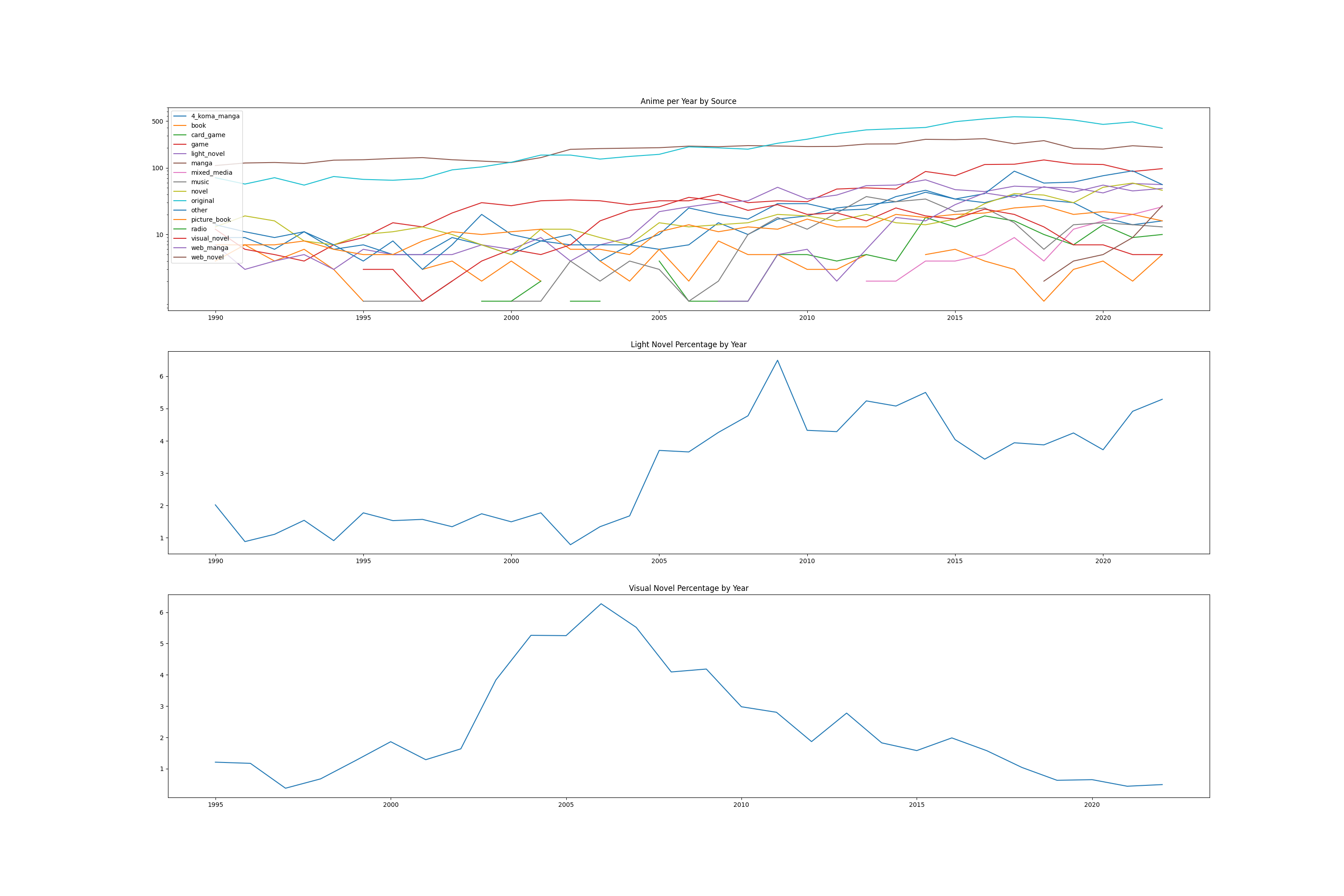Anime adaptation sources over the years
Or, are there really more LN adaptations than there used to be?
A recurring complaint in my anime-watching friend circles (and that I indulge in from time to time myself) is that light novel (LN) adaptations, mostly of the isekai1 genre, have been choking anime out in recent years2. Every season seems to have at least a small handful of them.
But was this actually the case, or was it some kind of mass confirmation bias? I thought I might try to put it all down into numbers. My approach was as follows:
MyAnimeList (MAL) is a site that serves as both an anime/manga database, as well as a way for the more dedicated among us to track what anime they've seen and what manga they've read.3 They offer an API that I figured I could use to scrape the metadata for anime over a decent period of time, and then graph the amount of anime that MAL lists as having been adapted from a light novel.
There are a couple caveats to this approach, mind you:
- MAL's metadata is occasionally incomplete. Some anime have their source listed as "unknown." I encountered about 3,000 such anime, and simply didn't factor them into the study.
- The metadata may not always be accurate. As an example, MAL's page for Ga-Rei Zero lists the source as "manga" despite the series being an anime-only prequel to the Ga-Rei manga.
Still, in my experience MAL is both very accurate and complete. I wrote a bit of messy Python to get the job done, scraping about 24,000 anime between 1995 and 2002; the code and data are both on Github if you want to replicate my experiments. But anyway — the graph:
What immediately jumps out at you is that we're not actually at "peak LN" at the moment — that actually happened around 15 years ago, which makes some sense; Toradora, Haruhi4, Toaru Majutsu no Index, and others all date from around this time. The amount of LN adaptations expressed as a percentage of all anime produced in a given year is trending back up though, and we could have a new "peak LN" as soon as 2025. So, to answer the original question, no, we're not at a historically-abnormal amount of LN adaptations, though if things continue we could easily end up there.
It'd be a shame to grab all that data and not do some more investigating, though. A lot of my favorite anime are visual novel (VN) adaptations, and I haven't seen many lately — are VN adaptations falling out of favor? It seems the answer is yes; "peak VN" was nearly 2 decades ago, when things like Kanon, Clannad, Fate/Stay Night (Studio DEEN's adaptation, at least), and Amagami SS were coming out. The only post-2010 VN adaptations I can think of are Steins;Gate, Planetarian, and ufotable's adaptation's of Fate/Stay Night's Unlimited Blade Works and Heaven's Feel routes. In all of those three cases, the VN being adapted was originally made during or before the "peak VN" era, too.
Some other interesting tidbits:
- If MAL is to be believed, we're actually in the golden/silver age of anime originals, which took me off guard, at least if we go by the number of originals produced.
- It used to be the case that the majority of anime for a given year were manga adaptations, and manga adaptations still seem to be a solid #2.
- The mixed media and web novel categories seem to be taking off — I think the majority of the mixed media projects are idol anime franchises, but I'm not sure what's powering the web novel trend.
Footnotes
[1] - A genre that involves an individual being transported to another world, basically. While not new — Fushigi Yuugi, Escaflowne, and Inuyasha all qualify, for instance — the modern ones are a bit more influenced by RPGs, and come with titles long enough to reach the point of parody, though this has arguably more to do with LNs and not isekai necessarily, e.g, Oregairu (Yahari Ore no Seishun Love Comedy wa Machigatteiru, phew.).
[2] - It's worth pointing out I don't necessarily have anything against LNs as an adaptation source. They can be very good (Fate/Zero, Violet Evergarden, the as-of-yet-unadapted Hakomari, etc.).
[3] - I've kept a list for little over a decade now myself.
[4] - Haruhi was a trendsetter in many ways (Kyon's sarcastic everyguy demeanor has been used and reused by many LN protagonists since, for instance).
